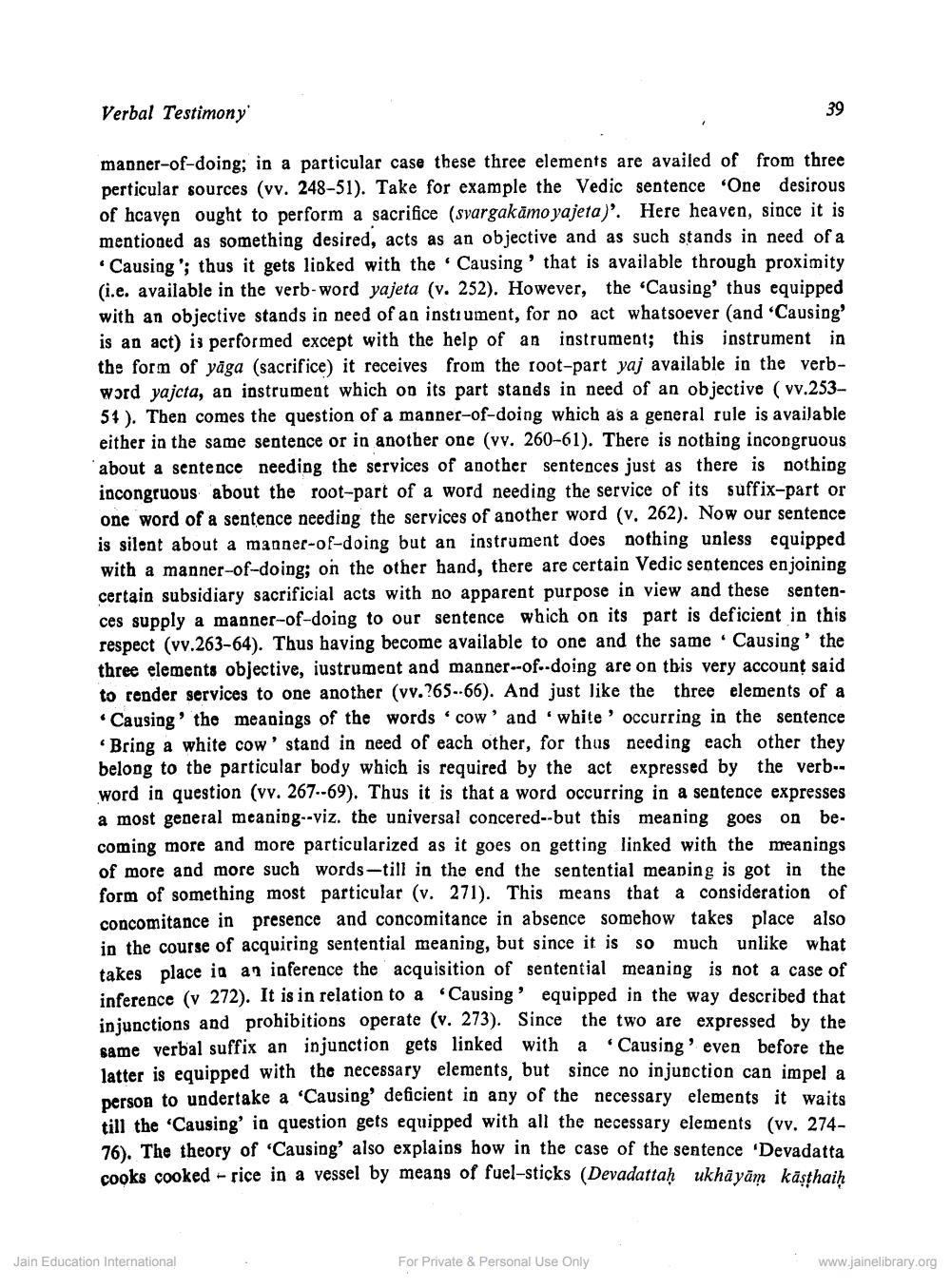________________
Verbal Testimony
20
manner-of-doing; in a particular case these three elements are availed of from three perticular sources (vv. 248-51). Take for example the Vedic sentence 'One desirous of hcaven ought to perform a sacrifice (svargakāmo yajeta)'. Here heaven, since it is mentioned as something desired, acts as an objective and as such stands in need of a
Causing '; thus it gets linked with the Causing' that is available through proximity (i.e. available in the verb-word yajeta (v. 252). However, the 'Causing' thus equipped with an objective stands in need of an instrument, for no act whatsoever (and 'Causing' is an act) is performed except with the help of an instrument; this instrument in the form of yāga (sacrifice) it receives from the root-part yaj available in the verbword yajcta, an instrument which on its part stands in need of an objective (vv.25351 ). Then comes the question of a manner-of-doing which as a general rule is available either in the same sentence or in another one (vv. 260-61). There is nothing incongruous about a sentence needing the services of another sentences just as there is nothing incongruous about the root-part of a word needing the service of its suffix-part or one word of a sentence needing the services of another word (v. 262). Now our sentence is silent about a manner-of-doing but an instrument does nothing unless equipped with a manner-of-doing; on the other hand, there are certain Vedic sentences enjoining certain subsidiary sacrificial acts with no apparent purpose in view and these sentences supply a manner-of-doing to our sentence which on its part is deficient in this respect (vv.263-64). Thus having become available to one and the same . Causing the three elements objective, iustrument and manner--of--doing are on this very account said to render services to one another (vv.?6566). And just like the three elements of a • Causing' the meanings of the words cow' and 'white' occurring in the sentence
Bring a white cow'stand in need of each other, for thus needing each other they belong to the particular body which is required by the act expressed by the verb-- word in question (vv. 267-69). Thus it is that a word occurring in a sentence expresses a most general meaning--viz. the universal concered--but this meaning goes on be. coming more and more particularized as it goes on getting linked with the meanings of more and more such words-till in the end the sentential meaning is got in the form of something most particular (v. 271). This means that a consideration of concomitance in presence and concomitance in absence somehow takes place also in the course of acquiring sentential meaning, but since it is so much unlike what takes place in an inference the acquisition of sentential meaning is not a case of ipference (v 272). It is in relation to a Causing' equipped in the way described that injunctions and prohibitions operate (v. 273). Since the two are expressed by the same verbal suffix an injunction gets linked with a 'Causing' even before the latter is equipped with the necessary elements, but since no injunction can impel a person to undertake a 'Causing' deficient in any of the necessary elements it waits till the 'Causing' in question gets equipped with all the necessary elements (vv. 27476). The theory of 'Causing' also explains how in the case of the sentence 'Devadatta cooks cooked rice in a vessel by means of fuel-sticks (Devadattah ukhāyām kästhaih
Jain Education International
For Private & Personal Use Only
www.jainelibrary.org




